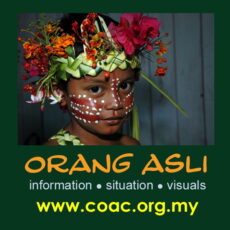Orang Asal representatives from Sabah, Sarawak and Semenanjung made representations to the RSPO Human Rights Working Group at its 2-day consultation in KL early this week. The object of the consultation was to appraise the draft RSPO Guide for Companies on Free, Prior and Informed Consent (FPIC) and Social Impact Assessments (SIA).
The Roundtable on Sustainable Palm Oil (RSPO) was established in 2004 with the objective of promoting the growth and use of sustainable oil palm products through credible global standards and engagement of stakeholders. Among its objectives are to monitor and evaluate the economic, environmental and social impacts of the uptake of sustainable palm oil in the market and to engage and commit all stakeholders throughout the supply chain, including governments and consumers.
Although the Orang Asal communities are not members of RSPO (as in not having paid membership fees or applied for membership in it), representatives were invited to the consultation to help provide their perspective on the palm oil industry and to highlight their specific cases of encroachment by oil palm plantations.
The RSPO process is not a fool-proof guardian of the rights of the Orang Asal to their customary lands, or even to the environment. It however remains an opportunity for communities to engage with stakeholders (such as the environmental NGOs, consultants and the large business players) in order to try to find a satisfactory resolution to the various conflicts indigenous peoples face when oil palm plantations encroach on their customary lands.
Click on the link to view the photo album: http://on.fb.me/1pNbpmm
CN-COAC | 4 July 2014
Yusri (JOAS-Semenanjung) explaining how Sime Darby is now occupying much of their traditional territory and how they have placed constraints on their movement to their village.
Nicholas Mujah from SADIA seeking clarification from Rahayu Zulkifli of RSPO-KL.
Suzanne from GVL in Liberia presenting the suggestions of the oil palm plantations sector.
Paulus from Kampung Tongod, Sabah presenting the recommendations of his workshop group.
Representatives from the industry side also argued that the RSPO guidance should also be directed at communities and NGOs, and not just the companies.
Patrick Andersen and Sophie Chao of the Forest Peoples Programme, London were the main organisers, together with Holly Shrumm of Natural Justice, Sabah.
The representatives of the Iban community in Kampung Lebor, Sarawak presenting a complaint to Darrel Webber, the CEO of RSPO.
Representatives from the environmental and concerned NGOs at their workshop table.

